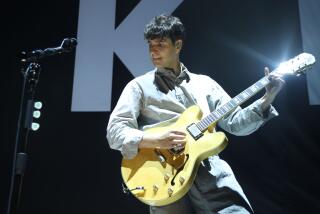Rockin’ and Rollin’ Out the Barrel
- Share via
CLEVELAND — Polka rocks.
More and more aficionados are infusing the music with rock ‘n’ roll in hopes of showing a new generation that polka is not just Old World music played on big accordions by men in polyester suits.
“We’re trying to bring to polka a more modern kind of excitement, and to rock we are trying to bring more fun,” said Don Hedeker, founder of the Chicago-based Polkaholics.
The band’s “We Play Polkas on Guitar” is a theme song for a growing group of rock/polka bands. It is played in the traditional oom-pah oom-pah, two-step polka rhythm--but faster, louder and with an electric guitar lead instead of an accordion.
In bow ties and ruffled shirts, the Polkaholics rock through polka favorites like “In Heaven There Is No Beer (That’s Why We Drink It Here)” and “Beer Barrel Polka.”
The music is partly a spoof of polka stereotypes, poking fun at the traditional allegiance of polka, kielbasa and beer. For instance, the Happy Schnapps Combo, based in Manitowoc, Wis., leads off its 1999 album “Beer Muscle” with a surf-party guitar polka called “We Can Get Drunker Than Youse.”
But in groups like the Polkaholics; Brave Combo, from Denton, Texas; and K!CK, from Oshkosh, Wis., the blend of rock and polka is also a serious effort to broaden the reach of a traditional music that has struggled to grab young audiences.
Brave Combo won a polka Grammy Award for the 1999 album “Polkasonic,” which hews closely to traditional polka but with a heavy electric guitar presence. The last track is a surreal version of Jimi Hendrix’s “Purple Haze,” with the famous opening guitar riff played on a saxophone.
“We can bring new people in that would under no other circumstances know this music,” said Brave Combo founder and guitarist Carl Finch. “We find that there are not a lot of preconceived ideas about polka with the college kids and younger. They haven’t had any exposure to it. They don’t know what it is.”
Polka has traditionally been a niche music market, and it is hard to track sales because the performers often sell more music at concerts than in stores.
The late Frankie Yankovic, one of polka’s biggest stars, has sold 97,000 albums in U.S. music stores since 1991, according to industry tracker SoundScan. Brave Combo sold 74,000 over the same period. By comparison, the Backstreet Boys have sold almost 29 million albums in the United States since 1991.
Polka suffers in part because of factionalism among fans.
There are separate polka halls of fame in Chicago and Cleveland, each featuring stars of those cities’ styles. The Chicago sound is descended from Polish polka, while the Cleveland style is rooted in Slovenian style.
Although outsiders may be hard-pressed to tell the difference, “there is a tremendous jealousy out there,” said Steve Popovich, president of Cleveland International Records.
“There’s this whole blinders thing--’If it’s not Polish, it doesn’t matter,’ or ‘If it’s not Slovenian, I won’t listen to it,’” he said.
Popovich is trying to break down those barriers. He has issued albums by Yankovic and another polka star, Eddie Blazonczyk, as well as the Brave Combo album that won the Grammy. In November, Popovich and his son Steve Jr. started Shotglass Records with a six-song rock/polka collection called “Extreme Polka.”
“I definitely do see polka on some kind of a rise,” said Michelle Jerabek, who plays guitar and saxophone for K!CK. “I see the younger kids getting into it. The college kids around here in Oshkosh are seeing us out there jamming in some public event and saying, ‘That’s weird, but that’s really cool.’”
Jerabek and husband Dan, K!CK’s accordion player, grew up playing in traditional polka bands. Both in their 20s, they represent the new generation of polka. Finch, 50, has been playing souped-up polka for 20 years.
The traditional polka audience is aging, said Richard March, a folk and community arts specialist with the Wisconsin Arts Board.
“In the previous generation, there were musicians and fans that genetically received a particular style--the style of their ethnic groups or the locality--and they developed a fierce loyalty to that style,” March said. “But now people are growing up in a more diverse culture.”
The new music worries some older fans.
“Some of the bands are going kind of ultra-modern and it’s hard for the traditionalist to accept, and you can see their point because they are trying to preserve their culture,” said Tony Petkovsek, who has hosted a polka radio show in Cleveland for 40 years, and acknowledged that the new style has broad appeal.
Linda “Big Lou” Seekins, of the band Big Lou’s Polka Casserole in San Francisco, said the marriage of rock and polka is natural.
“Polka was rock ‘n’ roll when it started” in Europe in the 1800s, she said. “It was a dance for the common people, and people were touching. Parents disapproved of it and there were riots in the streets.”
More to Read
Sign up for The Wild
We’ll help you find the best places to hike, bike and run, as well as the perfect silent spots for meditation and yoga.
You may occasionally receive promotional content from the Los Angeles Times.






